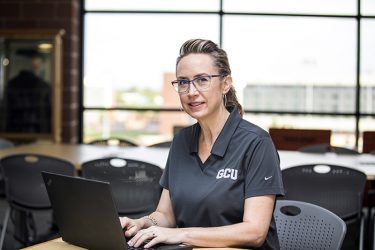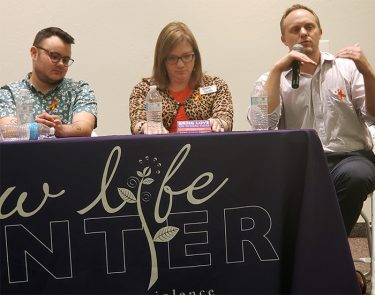
Story by Lana Sweeten-Shults
GCU News Bureau
On the first day of Bloom365’s seven-day curriculum about teen dating violence prevention, organization founder and CEO Donna Bartos said course leaders ask: “Is teen dating abuse a big problem among your peers?”
About 30% say, “Yes.”
Then on day two, something changes.
Participants go through a check list of teen-dating-violence red flags, which includes traditional signs, such as if a gun or weapon has been used to threaten them, if there’s stalking, possessive jealousy or sexual assault.
But teens at these trainings suddenly start checking off between five and seven of those red flags.
“We tell them, only 30% of you said this is a problem among your peers, but the majority of you are checking five to seven of these off the list. What changed?” Bartos asks them.
Their answer: “We didn’t realize that humiliation and isolation and jealousy are red flags of verbal or emotional abuse. We didn’t recognize it as that.”
That unfamiliarity with those nontraditional red flags – sometimes subtle signs of what could turn into abuse – and helping teens and young adults recognize those signs were reasons Grand Canyon University’s students wanted to bring the Teen Dating Violence Panel to campus.

The University’s HOSA Future Health Professionals chapter became involved when Elizabeth Carnesi, a state advisor for Arizona HOSA and a representative of the New Life Center, reached out to the chapter’s advisor, Marni Landry, the K12 STEM Outreach Manager for the University’s K12 Educational Development Department.
Carnesi and the New Life Center, a nonprofit that serves as a resource for victims of violence, wanted to collaborate on an event during Teen Dating Violence Awareness Month in February.
“This event was the first to educate our members and students about teen dating violence,” said Allison Martinez, President of GCU’s HOSA chapter. “It is an event we have never hosted before. But we’re excited to have it serve as a resource for students who are victims or know of someone who is a victim of teen dating violence.”
The panel on Thursday in Howerton Hall featured representatives not only from the New Life Center and Bloom365, but GCU and one-n-ten, a nonprofit that serves LGBTQ youth and provides them with tools to improve self-esteem and self-acceptance.
The reason to focus on teen dating violence specifically is that teens are new to relationships and formulating what a relationship looks like.

GCU panel representative Brett Berger, a College of Theology faculty member and the faculty advisor for the campus’ Sexuality and Gender Awareness Club, said, “Teens become adults, and if we can catch these things now while they’re dating, we can prevent these unhealthy behaviors from getting into marriages and toxic parenting down the road. So it’s going to be part of breaking the cycle if we can get them early on, and it’s just going to be easier to get out of an (abusive) dating relationship.”
Sebastian Blackwell, Satellite Program Manager for one-n-ten, added a few red flags of an unhealthy relationship that's specific to the LGBTQ community: threatening to out a person to their family or schools or even using housing as a tactic for control, since he said 40% of homeless youth identify as LGBTQ.
Seventeen-year-old Alex Kasten, Lead Peer Advocate at Bloom365 at Sandra Day O’Connor High School, said it’s about power, control and dominance in a relationship.
“Jealousy is HUGE and social isolation,” he said. “Some things I’ve seen is, ‘My boyfriend won’t let me hang out with my friends.’ And you see that they’re not around as much. They’re not as dependable and even, for something like Snapchat, everyone knows your location now, where you’re not at your house. It’s that dominating side.”
Bartos said “what we’re finding is a lot of coercion, coercive control, not just physical abuse, but 'Send me that picture or you don’t love me.' Seventy-nine percent of the teens that we survey … have said they have been asked to send a nude photo. We flip that question. 'How many of you have asked for a nude photo?' Forty percent.”
Bailey DeRoest, CEO of the New Life Center and moderator of Thursday’s panel, said teen dating violence affects nearly 1.5 million young people in America and asked how prevalent teen violence is in the panelists’ populations.
Bartos said, based on surveys by Bloom365 of the young people they serve in partner schools, the numbers in Maricopa County are higher than the national average.
“We’re trending at about 50% of teens who go through our curriculum – about 10,000 go through it a year – say they have experienced some form of verbal, physical or emotional violence in their dating relationships, and about 20 to 30% say they have perpetrated some form of verbal, physical or emotional violence.”
If a family member is experiencing teen dating violence, panelist Valerie Chihuahua, a New Life Center shelter youth advocate, said “Always believe, always believe. And follow up with ‘This is not your fault. You didn’t deserve this.' Provide them with the resources.”
Blackwell said it’s important not to tell someone what to do. “Our job is to put them in the driver’s seat and do everything we can to provide the right resources and information and a really good, competent referral.”
If someone suspects a family member is an abuser, Bartos said to, number one, make sure it’s safe for you to have a conversation with that person. “Letting them know you see what they’re doing without saying something is a good way. Just a look can let them know.”
She said, too, that teen perpetrators of violence need help. Have empathy for them. Ask if everything is OK.
Panelists also cautioned about asking why a victim didn’t “just leave” a relationship.
Blackwell said that question of “Why didn’t you just leave?” implies blame. “It negates the experience of what’s happening, and it places the blame and onus on the person.”
Bloom365, said Bartos, has changed the language it uses so not to imply blame, asking instead, “What are the barriers to safety? What are the barriers to healing?” and then telling victims that there’s help to remove those barriers to victimization.
So what’s the sign of a healthy relationship?
For Kasten, it’s mutual respect.
For Chihuahua, “It’s love, respect, honesty and trust.”
And for Berger, who has been married for 20 years, it’s something simple: He and his wife still like each other.
“I use the word like because it’s easy to love somebody. But liking is a different thing. I joke that the reason we have a healthy relationship is because we don’t NEED each other. I say it jokingly because it goes against every love song – ‘I can’t breathe without you,’ ‘I’ll die without you.’”
Berger sees it as a relationship with balance, without the power struggles, where one person is not draining the other person’s well and where it’s not all a one-sided take-take-take. “I’m giving to that person and she’s giving to me. We’re filling each other’s tanks.”
While February is Teen Dating Violence Awareness Month, DeRoest said preventing such violence isn’t limited to one time of year.
“We’re glad to have a month to at least highlight it,” she said. But she added, “It’s very important to have that month – and all year long.”
Added Bartos, “This issue does not stop after February ends.”
Contact GCU senior writer Lana Sweeten-Shults at [email protected] or at 602-639-7901.
***
Resources:
At GCU: The Office of Student Care has same-day availability appointments every day on a first-come basis. Go to the Office of Student Care on the second floor of the Student Life Building (Building 26) and fill out some paperwork between the hours of 8 a.m. and 4 p.m. to schedule an appointment or reach out to [email protected] for further assistance.















